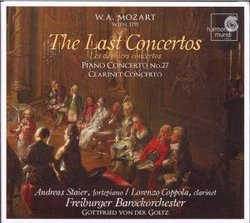| All Artists: Wolfgang Amadeus Mozart, Gottfried von der Goltz, Freiburger Barockorchester, Andreas Staier, Lorenzo Coppola Title: The Last Concertos Members Wishing: 0 Total Copies: 0 Label: Harmonia Mundi Fr. Original Release Date: 1/1/2008 Re-Release Date: 2/12/2008 Album Type: Import Genre: Classical Styles: Chamber Music, Historical Periods, Classical (c.1770-1830) Number of Discs: 1 SwapaCD Credits: 1 UPC: 794881866724 |
Search - Wolfgang Amadeus Mozart, Gottfried von der Goltz, Freiburger Barockorchester :: The Last Concertos
 | Wolfgang Amadeus Mozart, Gottfried von der Goltz, Freiburger Barockorchester The Last Concertos Genre: Classical
|
Larger Image |
CD Details |
CD ReviewsMozart's final concertos on period instruments Mike Birman | Brooklyn, New York USA | 02/23/2008 (5 out of 5 stars) "The third and final entry in a series of some of Mozart's instrumental music played on period instruments by the excellent Freiburger Barockorchester, this one focuses on Mozart's final year: 1791. The previous two years had been difficult for him: his letters to fellow Freemason Michael Puchberg, pleading for money to help tide him over as his debts mounted and his performances decreased, are a stark reminder of Mozart's rising desperation. They are hard to read without shaking your head and asking "didn't those people realize what a profound blessing they had in that little man from Salzburg?" The short answer is that they didn't care, at least for the most part. One of the exceptions was Puchberg, who never once declined to assist Mozart. Others, such as Baron von Swieten, assisted him in other ways. The Baron provided Mozart some Bach keyboard compositions in rare manuscript form. Mozart was stunned by Bach's achievement, studying the contrapuntal master with alacrity, absorbing his technique so that it quickly bore fruit in that final year. Bach's influence can be heard in the two concertos at hand as well as in the Magic Flute and the Requiem. It helped point Mozart in a new direction, one that he was unable to pursue as he never saw the end of 1791. The loss to music was incalcuable. Perhaps the greatest natural genius humanity has yet produced was silenced after a mere 35 years. This recording was made from manuscript copies containing Mozart's written directions. The Piano Concerto no.27, his final effort in that genre, is famous for its luminous simplicity, an otherworldly quality shared by the later Clarinet Concerto. Both works have a valedictory tenderness, a sense that Mozart is already saying farewell as if a premonition were advising him to do so. One major difference in this recording is that the Freiburger's follow Mozart's written indications to the strings, where by convention, markings of 'solo' mean a reduction to string quartet size in accompanying the piano. This reinvents the sound and sense of the concerto, increasing its sonorous beauty. Other changes have a similar effect. The result is a gorgeous and richly realized tone from the orchestra, heightened by the organic earthiness of the period instruments. The effect is dazzling. Andreas Staier is the pianist and he is superb on the fortepiano. He manages to avoid that early piano's natural tendency to clatter. Lorenzo Coppola is the clarinetist who plays a reconstruction of the original basset clarinet's part. That instrument, invented by Anton Stadler, had a lower register than the standard clarinet but the original composed part has been lost. Coppola plays with a beautifully rich tone; his technique both highly expressive and profoundly moving, especially in the tragic middle adagio movement. This CD is an example of how far we've come in the authentic instruments arena. Historically informed performances needn't be cold and clinical. These two final concertos are beautifully realized late Mozart that should be experienced by anyone who loves this composer. He will remain forever youthful as new ways of interpretation are discovered. Strongly recommended. Mike Birman" A Delight Roger Oakley | Melbourne, Australia | 12/02/2008 (5 out of 5 stars) "This disc is a delight.
As Mike Birman writes above, these are historically informed performances, but more importantly they are so musical and expressive they deserve to reach a wide audience. Both soloists play with imagination and taste, the orchestral support is oustanding and so is the recorded sound. Andreas Staier makes a compelling case for the forte-piano in this repertoire. I'm still enjoy his previous Mozart concerto recordings. The sound here is warmer than on the Teldec discs with Concerto Koln and it suits the slightly introspective tone of both these works. Lorenzo Coppola's basset clarinet sounds quite gorgeous, its lower register being particularly vivid. Mozart lovers with open ears should not miss this." |

 Track Listings (6) - Disc #1
Track Listings (6) - Disc #1